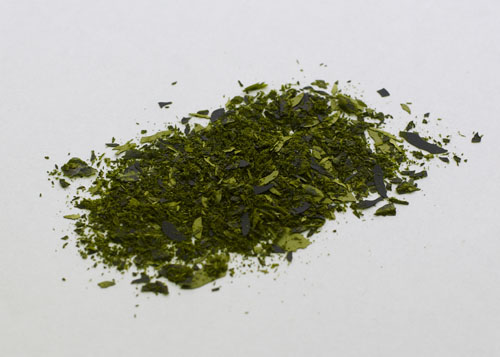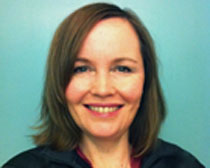Algae that could replace fish and crude oil
RESEARCH AND ENTREPRENEURSHIP
Across thousands of square metres in Skåne, Fredrika Gullfot plans to cultivate microalgae which she says can solve the problem of overfished seas.

“Algae oil also represents a renewable alternative to crude oil and fossil fuels,” says Gullfot, founder and CEO of Simris Alg. “It takes 600 sardines to produce just one tub of fish oil capsules. And the same beneficial omega-3 is also found in algae oil.
“At Simris Alg, we tend to describe ourselves as environmental activists. Overfishing and the devastation of the oceans are an enormous and underestimated environmental problem,” she says. “Not only is today’s large-scale trawling for fishmeal and fish oil causing the depletion of fish stocks, it’s also causing irreparable damage to coral reefs and marine habitats.”
Gullfot first had the idea of large-scale algae cultivation while researching enzymes in the cell walls of plants, as a doctoral student at KTH’s School of Biotechnology.

Alongside her studies, she noticed how interest in the cultivation of microalgae was growing in other countries, both for academic research and as a new form of industry.
“When I looked at the Swedish market, I discovered that algae cultivation was almost non-existent, which surprised me. But instead of emigrating and starting to work as a researcher or for an algae company in the US, I decided to start my own business here in Sweden.”
Gullfot gained industry knowledge by visiting algae farms and conferences overseas. Together with doctoral student Tony Fagerberg from Lund University, she decided to start an algae farm in Österlen, in southeast Skåne.
“Algae is dependent on solar radiation, and Österlen was clearly the best choice of location for operations in Sweden,” says Fagerberg, who had scrutinised the Swedish Meteorological and Hydrological Institute’s statistics. “What’s more, Skåne is Sweden’s strongest and most innovative region when it comes to agriculture and food production.”
And so Gullfot founded the company Simris Alg in 2010, with the aim of tackling two significant social challenges: the search for renewable energy sources, and the shift towards sustainable food production.
According to Gullfot, Swedish sales of omega-3 oil capsules are worth half a billion kronor every year. Globally, around one hundred thousand tonnes of fish oil are produced annually, with demand growing by eight percent a year.

We normally obtain essential omega-3 fatty acids by including fish and shellfish in our diet. However, factors such as recent concerns about low levels of omega-3 in farmed fish and warnings about environmental toxins in oily fish have led to a growing number of consumers turning to fish oil capsules instead as a source of omega-3.
“Fish oil capsules can be directly replaced with algae oil capsules,” explains Gullfot. “The marine omega-3 fatty acids DHA and EPA found in microalgae are identical to those found in oily fish. This is because fish obtain their omega-3 from microalgae in the sea.”
She also predicts a future rise in omega-3-enriched, functional foods, which are thought to offer health benefits and improved performance.
The European Food Safety Authority has approved a number of health claims for the marine omega-3 fatty acids EPA and DHA in relation to cardiovascular health, blood lipids, brain function, eyesight and the development of sight and brain function in young children.
According to Gullfot, omega-3 derived from microalgae is already used in around 90 percent of all infant formula milk sold worldwide.
“I’d like to see more omega-3 products being made from algae instead of fish,” she says. “The situation is urgent. Despite all the warnings about overfishing, few people have understood the seriousness of the situation when it comes to depleted ocean fish stocks.
“For example, not many people are aware that 80 percent of fish stocks have already been depleted. Peru, one of the biggest exporters of fish oil, recently slashed its fishing quotas by 68 percent as a result of overfishing.”
Gullfot explains that the benefits of microalgae cultivation include better efficiency in terms of surface area than other land-based oil crops.
“Algae cultivation yields 22 times more oil per hectare than rapeseed under Swedish climate conditions, without competing with valuable agricultural land for food production.”
Algae can also clean the water. It absorbs nitrogen and phosphorous, and the residual biomass when the waste water has been purified can in turn be used for fuel production.
“Raw oil from algae is very similar to fossil raw oil. President Obama recently said that as much as 17 percent of all oil consumption in the US could soon be met using algae. Test flights have already been carried out in several countries using algae fuel, and heavy transport vessels have been run using diesel from algae oil.”
Gullfot is now CEO of Simris Alg, and her team consists of six employees and a committed, active board of directors.
“The exciting thing about our business is that our products really make a difference in the real world. In international terms, Sweden is ten years behind industry developments. But here at Simris Alg we’ve adopted an aggressive expansion strategy – we already have a 3,000 m² production facility!”
Katarina Ahlfort

